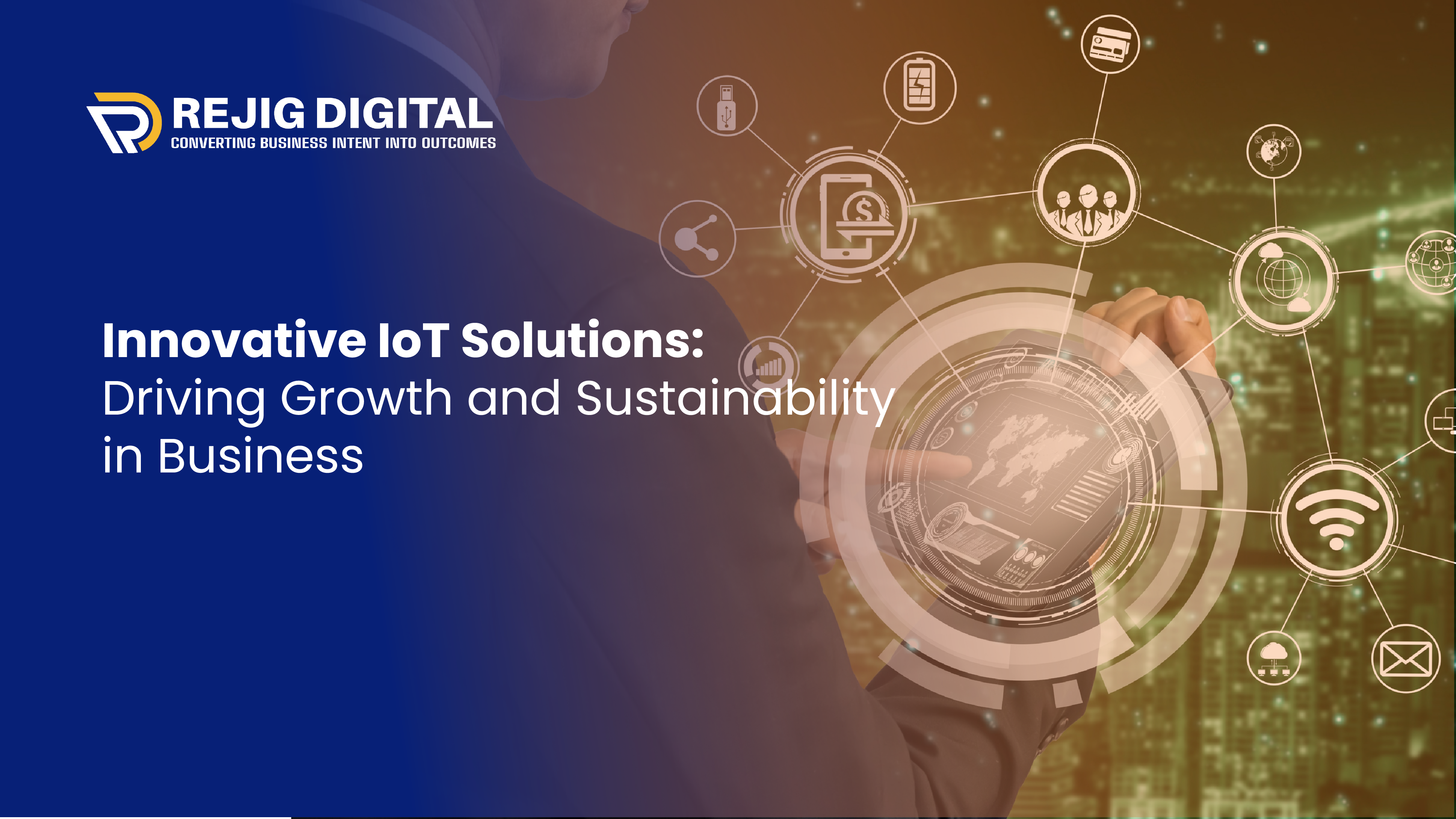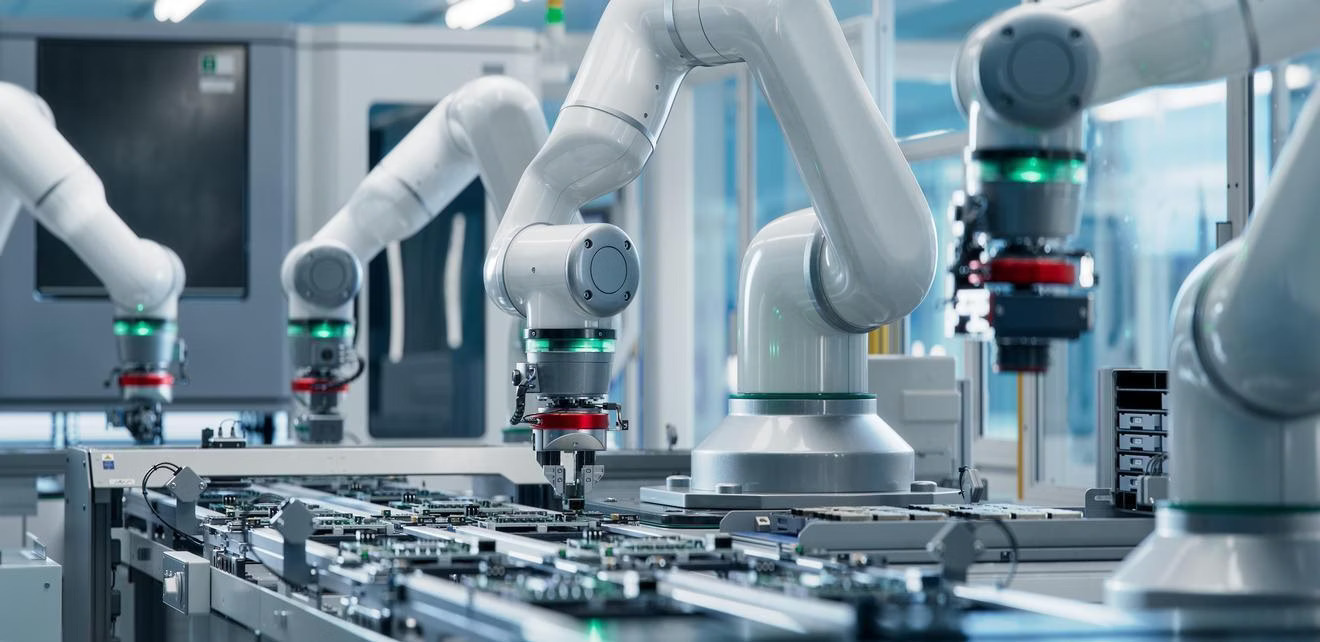The ever-changing world constantly requires something new. The Internet of Things (IoT) is a transformative technology that has changed the way we live and work. Industrial IoT business solutions comprise a network of machines that produce data for businesses and improve overall production by streamlining operations.
IoT plays a pivotal role in shaping the industries in the 21st century. This technological revolution isn’t only about offering convenience to customers but also about providing new opportunities. The ability to track real-time data through logistics and networks helps to track the entire process and increases the efficiency and capabilities of businesses across the globe.
In today’s era, achieving growth isn’t enough, businesses are also focusing on innovative solutions that help them to thrive in the market. Harnessing the interconnected devices and machinery helps them to pave the way towards the growth trajectory.
IoT Business Solutions for Industry 4.0
The term Industry 4.0 marks a significant improvement in an interconnected environment. The IoT business solutions provide a brain to the already existing traditional machines and drives the data-driven world which is ultimately the heart of Industry 4.0.
The communication between machines and sensors helps to monitor every step on the production line. This helps to check the real time data at any given moment. The integration of physical equipment and intelligent software allows the data to flow seamlessly. Which lets the Industrial IoT solutions serve as a nervous system for the interconnected ecosystem.
The sensors collect the data and send it to the network, this data transforms into pivotal insights. This includes health of the machine, performance, consumption and quality of the product. This data helps the Businesses to optimize their production process.
Predictive Maintenance
IoT business solutions can detect any potential equipment failures before they happen. This allows the businesses to take preventive measures beforehand that minimize downtime costs and equipment health.
Automation
Automation helps to take care of repetitive tasks. It can be automated in real-time, freeing the valuable time of human workers.
Quality Control
IoT-enabled machinery continuously monitors the quality of the product and ensures consistency is maintained and that no defective products are found on the line.
How does IIoT work?
The Industrial Internet of Things (IIoT) is reshaping the industrial operation landscape. At the center of it all, there is a systematic process that looks after data collection, processing, and applying intelligence for future decision-making.
Collecting Data
A vast amount of data is required to train the large models. Large-scale organizations need to have the ability to gather vast amounts of data from industrial machinery. The data originates from the sensors, equipment, and sometimes even with human input. These sensors continuously monitor parameters such as temperature, pressure, humidity, vibration, and more.
Processing the Data
Once the data is collected, it then goes for processing. It goes through meticulous processing to transform into insights. There are multiple types of complex algorithms at work that identify the patterns from the raw data. Advanced data processing techniques, such as cloud computing, can handle a large volume of data generated by IIoT.
Applying Intelligence for IoT Business Solutions
The goal of IIoT is to utilize the data that has been collected. It helps to optimize the industrial process, improve productivity and drive innovation. Machine learning algorithms, predictive analytics, and artificial intelligence (AI) help the equipment optimize to the maximum efficiency level. These intelligent capabilities can empower industrial organizations by minimizing downtime and maximizing performance.
IIoT Benefits
The innovative solutions of IIoT extend beyond increasing efficiency across all business areas. The key benefits of Implementing IIoT include the following:
Increased Efficiency and Productivity:
One can imagine what happens when machines are able to mimic human actions. The overall efficiency of equipment reaches its maximum level when they are facilitated with IoT sensors. The sensor-driven insights stream the data constantly to identify the areas of improvement. It eliminates the tasks that are repetitive and mundane.
Enhanced Customer Experience
In today’s competitive landscape, it is essential to grab customer’s attention and provide the best service to them. Innovative IIoT solutions can offer personalized details to customers by analyzing their needs.
The connected product facility enables smart appliances to learn from customer preferences and provide personalized recommendations. This level of connectivity binds the customer in an ecosystem and builds loyalty. The technology also helps to provide real-time updates to users.
Data-driven approach
IoT generates a vast amount of data. These devices hold immense potential to uplift the businesses. Companies can leverage these tools to gain valuable insights that help them make the right decision.
Predictive Analytics
Analyzing historical and real-time data helps businesses predict future trends and the demand of customers. It also helps in identifying equipment issues or potential disruptions in the supply chain. This leads to better planning, risk avoidance, and mitigation from the beginning.
Innovation Scope
The insights received from IoT-enabled equipment can lead to new product development and innovation. Businesses can learn from the received data and create solutions that help them stay ahead of the competitive market curve.
How IoT Busines Solutions Promote Sustainability
The benefits of IoT solutions are not only limited to business growth; their positive impact extends far beyond the bottom line. These solutions serve as powerful tools in promoting environmental responsibility.
Resource Optimization
Earth has limited resources; businesses are supposed to ensure the responsible use of the available resources to contribute maximum to society.
Smart Monitoring
Lighting, heating, and ventilation data can be calculated and predicted to adjust plant resources so that maximum capacity is utilized automatically. IoT sensors and connected systems can facilitate intelligent resources.
Agriculture
IoT sensors can monitor soil, moisture, nutrients and weather to target irrigation and fertilization, which requires minimum water consumption.
Pollution
IoT sensors can monitor air quality, water pollution and noise pollution in real time. This data can help environmental agencies identify areas of pollution and their sources.
Disaster Management
Early warning systems can detect natural disasters like floods and wildfires. This allows for faster response times and improved evacuation plans.
Logistics Tracking
IoT-powered sensors can track goods through the supply chain, providing valuable insights about the transport and storage conditions.
Smart Solutions of IoT
There are multiple specific innovative solutions that IIoT brings to various aspects of industrial operations.
Plant Automation
IoT in Manufacturing includes automotive robots that provide real-time optimization of the production capacity. Data collected through sensors provides continuous feedback on the
improvement while robots perform the tasks along with human workers.
Smart Contract Solutions
This technology also helps into the business transactions and triggers automatic payment collection w. This process enhances supply chain transparency, leading to verifying the origin of the product, quality of goods, and conditions throughout the transportation process.
Resource Utilization
Optimizing the resources is crucial from both perspectives economic and environmental. The IIoT tools offer various sensors that can monitor energy consumption and save energy using innovative grid systems.
Inventory Management
Sensors and RFID tags can help track inventory levels in real time to trigger the required order automatically. The pre-defined measurements can be retrofitted to prevent the stockout scenario. Demand forecasting can also help to look for the upcoming requirements and manage the stock accurately.
Asset Tracking
GPS and other location-based sensors can provide remote asset monitoring in real time and minimize the risk of losing or damaging the items. Sensors can also keep an eye on the health of machinery and prevent scenarios that may harm the lifespan of valuable assets. IoT in transportation can also detect theft and alarm the security teams to avoid losing the asset.
Conclusion
The Industrial Internet of Things (IIoT) has started a new era of businesses and possibilities that helps to harness the power of transformation and automation. The true potential of IIoT is driving sustainable growth. The future of IIoT looks shining, and this journey towards a more efficient future has begun, where development and sustainability will go together.
FAQs
What is IoT used for in business?
IoT is used for advancing operations, predicting maintenance, managing supply chains and developing new innovative products.
What are IoT business solutions?
IoT business solutions is an interconnected device network that collects, analyzes and increases the efficiency of business by providing better decisions and enhancing customer experience.
What are the IoT solutions for Manufacturing?
IoT solutions for manufacturing provide a sensor driven insight that looks after predictive maintenance, real time monitoring and data driven insights.
What is the IoT business strategy?
An IoT business strategy involves defining specific use cases, identifying the required data and choosing the right set of sensors and tools to develop a plan.
What are the 4 types of IoT?
Consumer IoT, Industrial IoT, Enterprise IoT, and Infrastructure IoT are 4 main types of IoT.




